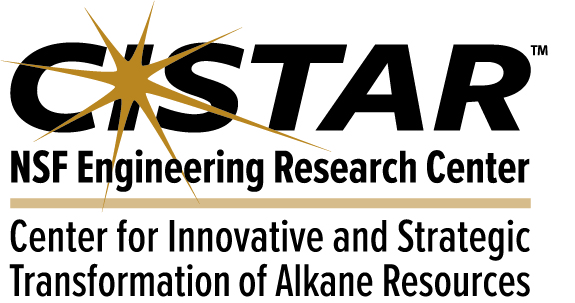Center-to-Center (C2C)
 CISTAR has teamed up with two research centers in Brazil: the Center for Innovation on New Energies (CINE) and the Research Centre for Greenhouse Gas Innovation (RCGI)as part of the C2C grant to collaborate on critical research and enhance educational opportunities in the area of hydrocarbon processing. The C2C is made possible with supplementary funding from NSF, and the Brazilian Sao Paulo Research Foundation (FAPESP), the foundation that supports research in the state of São Paulo.
CISTAR has teamed up with two research centers in Brazil: the Center for Innovation on New Energies (CINE) and the Research Centre for Greenhouse Gas Innovation (RCGI)as part of the C2C grant to collaborate on critical research and enhance educational opportunities in the area of hydrocarbon processing. The C2C is made possible with supplementary funding from NSF, and the Brazilian Sao Paulo Research Foundation (FAPESP), the foundation that supports research in the state of São Paulo.
All three centers have similar goals, but each has distinct, yet complementary, approaches. The teams are able to share their expertise in these relevant research areas with the broad goal of lowering the global carbon footprint as the technology and infrastructure is developed for renewable energy sources.

2025 Growing Global Energy Leaders
In summer 2025, a summer Growing Global Energy Leaders (GGEL) Graduate Certificate Program was offered to graduate students and postdoctoral scholars who were working with faculty who are part of a National Science Foundation Center-to-Center (C2C) research grant across three energy centers

2022 Growing Intercultural Global Energy Leaders: A Graduate Certificate Program
The Growing Intercultural Global Energy Leaders (GIGEL) program is a 7-week certificate program designed to build intercultural awareness and skills, forge international personal and professional connections, and encourage thinking about the global energy landscape as part of the C2C collaboration between CISTAR, the Center for Innovation on New Energies (CINE) and the Research Centre for Gas Innovation (RCGI).

CISTAR Visit to C2C Partners in Brazil
Members of the CISTAR Leadership team traveled to Brazil as part of the Center-to-Center grant - a joint partnership with the Center for Innovation on New Energies (CINE) and the Research Centre for Greenhouse Gas Innovation (RCGI). The team visited the Universidade Federal Do Rio De Janeiro (UFRJ), the University of São Paulo, RCGI, CINE, International Pollutants Elimination Network (IPEN), Sirius at Brazilian Synchrotron Light Laboratory (LNLS), and The Federal University of ABC (UFABC).

Claudio Oller (USP professor) giving a seminar at the University of Notre Dame during his recent visit in October 2022.

CISTAR's Alex Dowling (University of Notre Dame) touring São Paulo with Pedro Gerber Machado (post-doc) and Celma Oliveira Ribeiro (USP professor).






